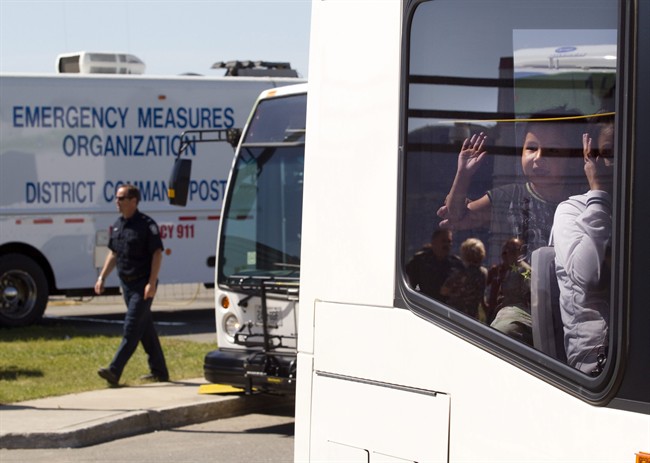DRYDEN, Ont. – It is not necessary to declare a state of emergency right now to deal with forest fires that have driven thousands of people from their homes in northwestern Ontario, Premier Dalton McGuinty said Friday.

McGuinty was in the region to survey the damage and talk with fire personnel, volunteers and evacuees, and said he would “leave that door open,” but that for now the province was doing a lot already to help.
“We’re listening to advice that we get, but it doesn’t appear to us certainly at this point in time to be necessary,” McGuinty said.
“I think if I was caught up in this, I have one question alone: That is, ‘Are we doing everything necessary to protect me, my property, to get these fires out?’ I think those are the big questions everyone’s asking and the answer in all three cases is, yes we are.”
The situation is an emergency as far as he is concerned and the province is treating it as such, McGuinty said. Help being provided includes aircraft and financial support for the effort, he said.
“I’ve also said to the folks I’ve met with here today, ‘If there’s anything else we need to do, you need to let us know,'” McGuinty said. “I’m confident we’re doing what needs doing.”

Get breaking National news
Howard Hampton, the NDP natural resources critic, represents the Kenora-Rainy River district which includes communities affected by the forest fires. After visiting several of them, Hampton said people are frustrated and don’t think the province has a good grip on the situation.
“I think this is an emergency,” he said in an interview from Toronto. “I think it warrants a state of emergency declaration. We’re going to be very lucky to avoid having whole communities burned down … I think we’re also going to be lucky to avoid loss of life.”
Hampton visited six communities, but couldn’t land in another seven because the air was too thick with smoke to see landing strips, he said.
“You have some communities where the forests are burning up within five or 10 kilometres of the community,” Hampton said.
“What you have to understand is these fires get so hot the flames will be 300 feet in the air and so the heat is so intense that you get the spontaneous combustion of trees.”
The premier visited Thunder Bay later in the day, where he said advice he received from local officials would be incorporated into the provincial plan to deal with the fires.
He left a premiers’ conference in Vancouver two days early, saying he wanted to make sure all assistance possible is offered to those affected by the fires.
Nearly 3,600 people have been evacuated due to heavy smoke and fast moving flames, with many destined for communities far from home.
The province says 111 fires are burning over nearly 5,000 square kilometres of forest, mostly in the northwest, though showers have brought some temporary relief in many of the blazes.
More than 2,000 firefighters and support staff, including 621 personnel from other provinces, are battling the fires.
Most out-of-province firefighters are from British Columbia, which sent another 74 to Ontario on Thursday, bumping its total contribution to well over 500.
Twenty-one water bombers and more than 90 other aircraft are involved in the operation.
Ontario has deployed a special medical team to Thunder Bay, where evacuees are initially being sent.
The Canadian military said late Friday that after evacuating more than 3,600 residents, its airlift services were no longer needed. Defence Minister Peter MacKay said the situation will be monitored, however, and the military will be pressed into service again if required.
Six CC-130 Hercules military transport aircraft flew 42 missions, evacuating 3,614 people from seven community since July 6, 2011. Half of those flights took place in the past three days.







Comments